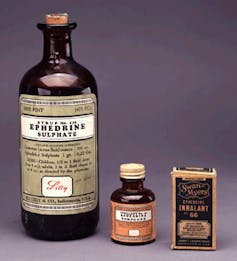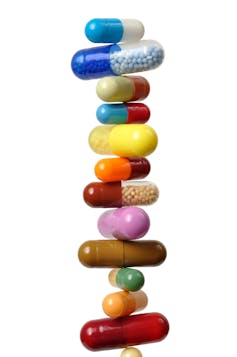Will Ephedra Ever Be Legal Again
In a written report published terminal week, researchers at Harvard University examined 21 brands of dietary supplements containing an herbal stimulant called Acacia rigidula. More than than half of the brands analyzed contained an untested amphetamine isomer called β-methylphenylethylamine (BMPEA).
The supplements were marketed to help people lose weight and to enhance free energy. Fifty-fifty though BMPEA was first synthesized in the early 1930s, it is relatively unstudied. Because studies of condom and efficacy in humans accept not been performed, its unknown whether it is dangerous. It appears that BMPEA is intentionally added to these supplements for its stimulant properties and since it is non listed on the labels of these products, consumers have been unknowingly ingesting this untested stimulant.
Dietary supplements aren't regulated the same way drugs are, which creates a legal loophole that allows untested stimulants like BMPEA onto the market.
And this has happened earlier with a different synthetic stimulant: ephedrine.
History repeats itself: ephedrine
The story about synthetic stimulants popping up in dietary supplements is non new. A little over a decade ago the major dietary supplement of concern in the U.s. was ephedrine (an alkaloid plant in ephedra).
Ephedrine was widely used for weight loss and functioning enhancement (although it as well has canonical medical applications). Utilize of ephedrine supplements was highly prevalent by the late 1990s, and between 1996 and 1998 an estimated 2.5 1000000 people in the United states used ephedra (or ephedrine) supplements.
As I discuss in my historical review of ephedrine use in the US, ephedrine was sold and used as a "legal" amphetamine "look-akin" drug for decades after amphetamine became a controlled substance in 1970. In an ironic twist, amphetamine was really get-go used in the early 1930s equally a replacement for ephedrine.

Ephedrine products were likewise sold every bit legal replacements for other illicit drugs in the tardily 1990s. For example, ephedrine was a principal ingredient in a production called Herbal Ecstasy, which was promoted as a legal and healthier alternative to MDMA (ecstasy).
In 2004, the Federal Drug Assistants (FDA) banned ephedrine from dietary supplements as information technology was deemed an unreasonable risk to public health. While FDA-approved ephedrine and pseudoephedrine products remain available "behind the counter" as drugs (in some asthma medications, for example, and in common cold medicine, like Sudafed), ephedrine supplements are banned.
The media focused heavily on the thousands of self-reported adverse events potentially related to use (there were more than 18,000 reported by 2004). However, the media, FDA and public may not have considered that once ephedrine was banned, information technology would exist replaced by new stimulant drugs, which might not be much safer than ephedrine.
It'southward not easy to ban stimulants in supplements
Correct after the FDA finally managed to ban ephedrine from dietary supplements another stimulant drug called synephrine (bitter orange) popped up in supplements to replace it. Despite business concern from the media and from some scientists, synephrine products do not appear to be as unsafe as ephedrine and remain legally available today. Shortly after the ephedrine ban another potentially dangerous stimulant called methylhexaneamine (DMAA) besides popped upwards in supplements and the FDA stopped companies from selling these products. Fast forward a few years and at present multiple products contain BMPEA.
In the ongoing game of regulatory Whack-A-Mole, BMPEA is but the latest stimulant to popular up in the wake of another being banned.
Another ephedrine situation?
In the U.s.a., substances sold equally dietary supplements are not considered "drugs" and autumn nether the Dietary Supplement Health and Education Deed of 1994 (DSHEA). Thus they are nearly unregulated unless an issue arises. Under DSHEA, substances generally do non require safety testing. But when many adverse reactions are reported, a substance may be deemed unsafe and the FDA is to step in and ban its sale.
Although BMPEA is not illegal to possess or distribute in the Us (at least not notwithstanding), in that location appears to be two issues regarding BMPEA actualization in many Acacia rigidula supplements such as Jet Fuel and Yellowish Scorpion. First, BMPEA is not listed on the label. Second and more importantly, it may be an adulterant that turns out to be too dangerous for the average person to consume.
Unlike ephedrine, nosotros have not learned of thousands of adverse events existence reported to the FDA. So despite BMPEA being an amphetamine isomer, use may non be every bit unsafe equally it is beingness fabricated to look, whether or non the drug belongs in supplements.

The FDA has been aware of some dietary supplements containing BMPEA for over two years now, but they take not even so recalled these products or issued a public warning that some products contain this drug. However, these new findings from the Harvard researchers may in fact prompt a alarm.
Simply there is always a run a risk that a alarm volition be somewhat ineffective and that, similar ephedrine, this drug may remain available. If people were using BMPEA to get high (if it is even possible) instead of using it for fitness purposes, information technology would be a different story and the Drug Enforcement Administration (DEA) would probable pace in to control use.
Putting word of the need for proper testing and labeling bated, is the appearance of this new drug really unexpected? While some stores are willingly removing these products from their shelves, information technology would probable take a while for the FDA to issue a ban. And different ephedrine, the evidence that BMPEA can be dangerous is non at that place. Regardless, just like the hundreds of stimulants in new "legal highs", BMPEA drugs volition probable remain available over the internet even if it gets banned.
My question is what should we worry about more – the products containing this untested stimulant drug or the new untested stimulant drug that will eventually replace it? Stimulant drugs – whether used equally dietary supplements or used to get high — will always have replacements once they are banned or controlled. If BMPEA is removed from products, will the next stimulant to supercede it exist more than unsafe?
Source: https://theconversation.com/stimulants-in-dietary-supplements-when-one-is-banned-another-takes-its-place-40066
0 Response to "Will Ephedra Ever Be Legal Again"
Post a Comment